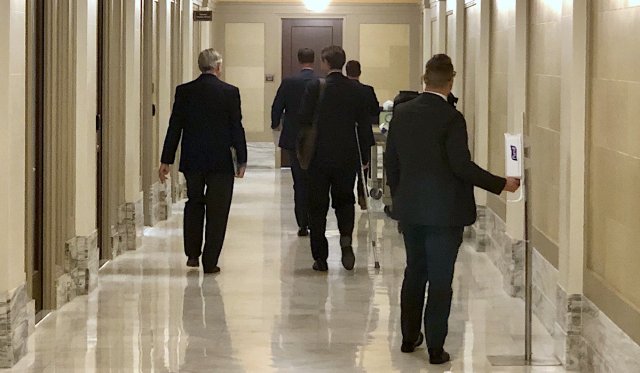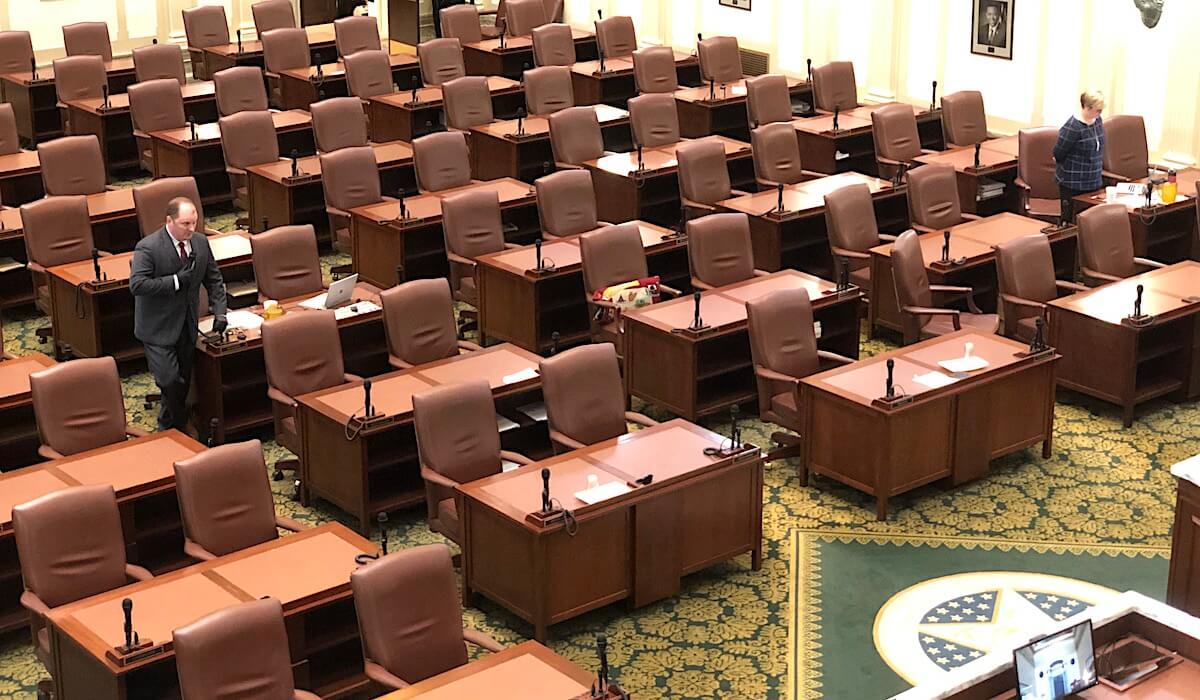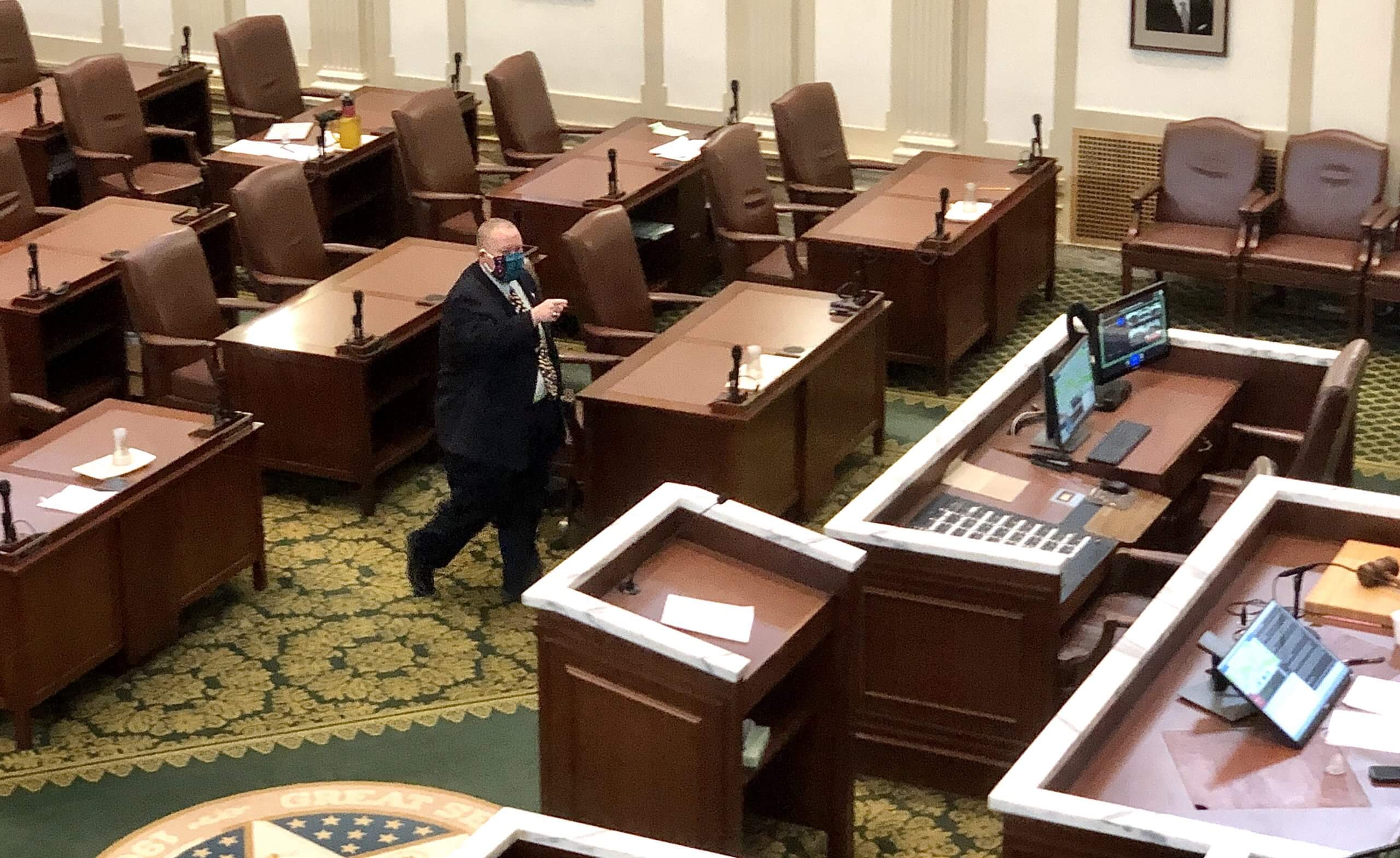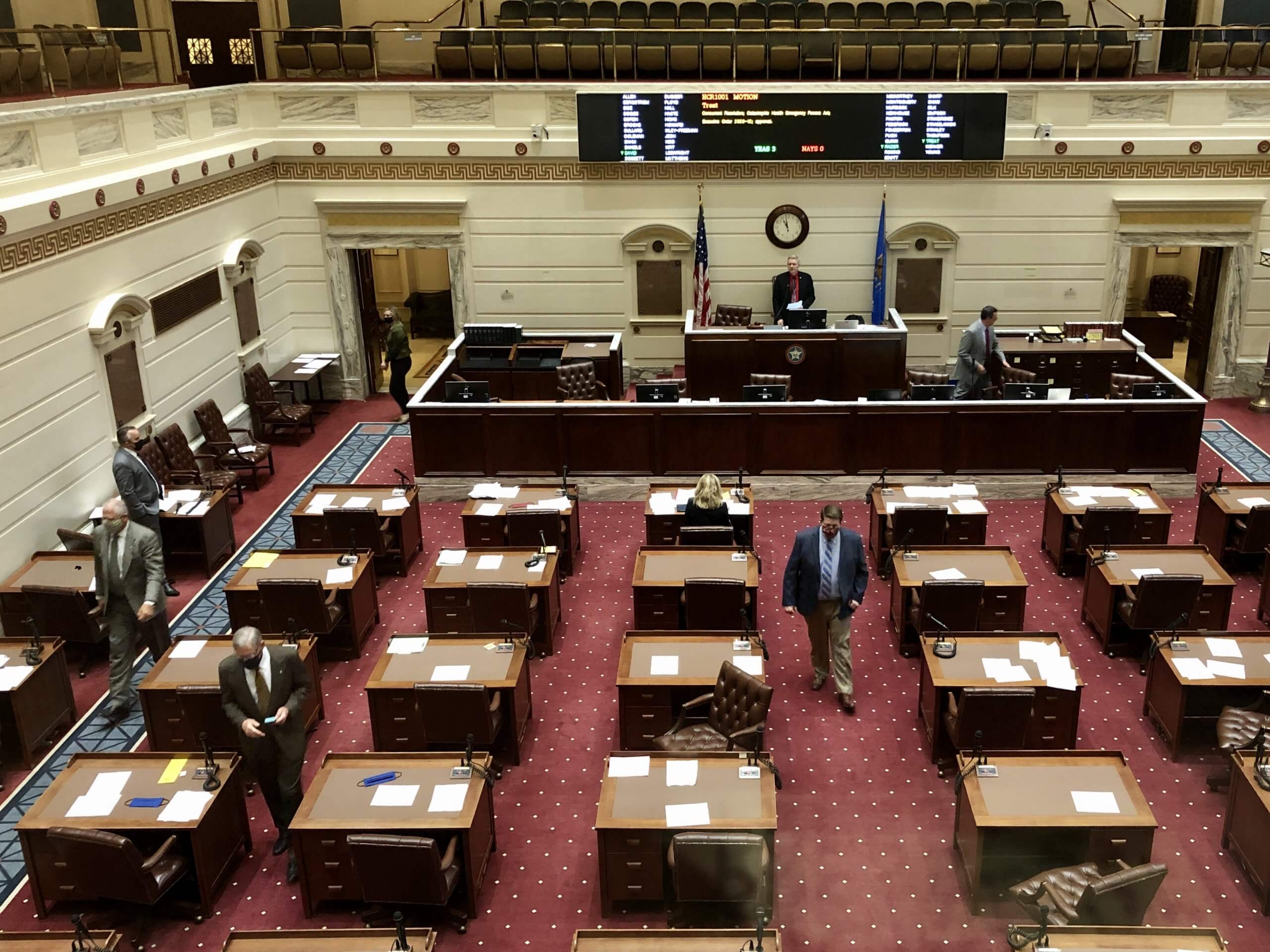

What seemed to be a simple agreement to address Oklahoma’s revenue failure turned into a cancelled meeting, an elongated day and a dispute between the Legislature and Gov. Kevin Stitt over funding for his priority of digital transformation projects. In the end, the Legislature’s upper chamber accepted the bills advanced by its lower chamber without addressing — for now — the governor’s desire to retain the full $15 million approved for digital transformation of state government last year.
After the House of Representatives sent three budget-filling bills to the Senate by 10:15 a.m. using proxy voting and unprecedented social distancing protocols, Stitt and his budget secretary visited House Speaker Charles McCall’s office at noon. The first-term governor was frustrated by a provision in one of the bills, SB 617, that specifically omitted funding for the state’s digital transformation efforts, which Stitt has championed since assuming office.
An hour later, Secretary of Budget Mike Mazzei announced that the 1 p.m. Board of Equalization meeting was being postponed. The board features state executives, including Stitt, whose job it is to certify revenue estimates and officially declare a revenue failure if gross receipts fall outside the 95 percent parameter of the previous year’s estimate. Last week, Stitt had announced a $416 million revenue failure estimate, and the House advanced SB 199, SB 617 and SB 1053 this morning to fill the entire hole, except for monies previously dedicated to digital transformation.
Just before the Senate was set to take up the measures, the Stitt administration issued a press release underscoring their frustration.
“We have to resolve some additional items before the Board of Equalization can certify the full revenue failure of $416 million,” Stitt said. “I look forward to working with the House and Senate over the next week to negotiate the budget for the remainder of this fiscal year and for [Fiscal Year 2021].”
But the Senate ultimately sent all three bills to Stitt’s desk less than an hour later without questions or discussion about the dispute. Without the official declaration of a revenue failure, however, provisions in at least one of the bills would not be triggered, and it’s unclear what that means for state agencies.
After the Senate adjourned and he completed some meetings, Senate President Pro Tempore Greg Treat (R-OKC) said media needed to ask Stitt’s office for clarification about why the Board of Equalization meeting was cancelled.
“Everything I know about it is hearsay,” Treat said. “I was fully anticipating them meeting.”
Treat also said he could not explain why the Legislature omitted the digital transformation funding, which he said he believes totals about $254,000.
“I think you’ll have to ask the House,” Treat said. “They’re the ones who amended that.”
Asked through his communications director, McCall offered an official “no comment” on the episode.
Meanwhile, Stitt’s reference to extending negotiations into “next week” left House Minority Leader Emily Virgin frustrated.
“It’s unconscionable to me if the governor were holding up these ‘rainy day’ funds for his digital transformation fund,” Virgin said. “We are trying to keep core services whole — like education and health care — during the pandemic.”
But Stitt’s chief of communications, Charlie Hannema, said the Legislature’s narrow cut was “unacceptable.”
“At a time when so many Oklahoma families are hurting, the governor believes we need to be fiscally responsible,” Hannema said. “Singling out digital transformation for a funding cut is unacceptable at a time when the unemployment call center is receiving more than 200,000 calls per day and thousands of state employees are teleworking in order to continue providing vital services to Oklahomans.”
Virgin (D-Norman) said while she can recognize the need for continued digital investments during a pandemic that has expanded the public’s need for accessing government services online, she does not believe the Legislature’s action will impair those efforts.
“I would remind the governor that the emergency declaration we affirmed today gives him the power to move up to $50 million into any area that needs it,” Virgin said. “When you compare the perhaps $1 million we are arguing over with the $50 million the governor could spend because of the emergency declaration the Legislature affirmed today, it really doesn’t make sense.”
She pointed to the Digital Transformation Program Revolving Fund’s existing balance.
“It appears to me that the digital transformation fund right now has about $8 million in it, and I’m failing to see how that is inadequate to do what needs to be done like shore up the services of an agency like the Oklahoma Employment Security Commission,” Virgin said. “After a day where the Legislature and both chambers showed so much cooperation and bipartisanship for the state in an uncertain time, it was truly shocking the governor would do something like this.”
Legislature approves Stitt powers under catastrophic emergency

Hours earlier, Virgin had joined one of her longtime Republican colleagues on the House floor to conduct a series of historic votes in unprecedented circumstances.
Wearing disposable black gloves and a pinstripe black suit, Jon Echols stood in the center of the chamber and grasped his microphone. Only two other legislators, a staff member and a smattering of media filled the expansive three-story room.
At 8 a.m. sharp, Echols, the House’s floor leader for the majority party, started a required special session with a prayer for “peace” in Oklahoma and then ran the strangest show of his eight-year legislative career.
With the assistance of Virgin and House Speaker Pro Tem Harold Wright (R-Weatherford), the House used a combination of proxy voting and eight-person voting groups to approve Gov. Kevin Stitt’s “health emergency” declaration.
“It was stressful. It was surreal,” Echols said after the day’s unusual events. “There were only four people out there, but the stress was palpable.”
As House members — many wearing masks and gloves — grew used to voting in small groups, the process sped up.
“I was excited we were able to have questions so people could see how it went, and it was still a deliberative process,” said Echols (R-OKC). “Members were still engaged, were listening and had the ability to represent their districts with their votes.”
Only one House member — Rep. Tommy Hardin (R-Madill) — voted against HCR 1001X, which affirmed the governor’s health emergency declaration. During questions of Echols, Hardin asked whether he thought a “catastrophic” declaration for COVID-19 would make the public take such a declaration less seriously in the future.
“I do consider this catastrophic,” Echols said. “Remember, I’m from the Oklahoma City area. I don’t agree this will cause more harm than good.”
Hardin released a statement hours later explaining his vote against the resolution.
“My actions today are not in any way meant to diminish the suffering of Oklahomans who may be ill with COVID-19 or who have lost loved ones to this disease. I don’t believe, however, that this current health crisis meets the requirements of the Catastrophic Health Emergency Act,” Hardin said. “I believe the Legislature could have worked with the governor to grant him specific authority on some of the sections of law in this act. Furthermore, the Legislature could have extended that more limited authority for longer than 30 days, ending the requirement for multiple days of special session, saving the taxpayers money.”
‘There is a requirement for notification’
To ensure explanation of the unprecedented measure, Virgin mixed fastballs with softballs in her questions to Echols. She asked whether the Legislature would have safeguards for giving Stitt powers to spend money and suspend laws and rules to combat COVID-19.
“Inside this HCR, there is a requirement for notification,” Echols said. “We have made the commitment that that information will be made public on our end.”
But Virgin also asked Echols whether the governor should expand his “safer-at-home” order to cover all age groups and not just seniors or the immunocomprimised.
“I think there is functionally no difference there between safer-at-home and shelter-in-place. I think in function they are the same thing,” Echols said, adding that he does not expect the governor to supercede the authority of mayors who have issued broader orders.
Virgin asked Echols if he knew whether Stitt planned to shrink his list of “essential” businesses allowed to remain open.
“I do think there needs to be a debate around what is and is not an essential business,” Echols said. “[We need to ask] what do we need to essentially survive day-to-day?”
After the House adjourned, Echols praised Virgin for her leadership and bipartisan partnership during these unusual times. In a break from typical process, Wright called on Virgin to recognize Echols to present the House resolutions.
“We were working so well together, we were literally running the process together,” Echols said. “That’s what we were willing to do to show that bipartisanship. Since I’ve been up here, that’s a first.”
Echols said the Catastrophic Health Emergency Powers Act is essentially “the Oklahoma war-time powers act.”
“I hope it’s something we don’t extend after 30 days,” Echols said. “But you heard the questions. We are going to see how the governor uses that authority.”
An hour after the House adjourned, the Senate suspended rules and took up HCR 1001X, which passed 39-1, with Sen. Nathan Dahm (R-Tulsa) casting the lone vote in opposition. Both chambers also passed HCR 1002X, which allowed the Legislature to adjourn its special session for more than three days.

Savings (should?) help avoid state budget cuts amid recession
Before and after their disagreement with Stitt became public, legislative leaders emphasized their pleasure that last year’s savings — chiefly championed by Stitt — would allow for the avoidance of state budget cuts from this year’s revenue failure.
To that end, House members remained positive about the three measures the Legislature sent to Stitt’s desk:
- SB 617 allowing the Office of Management and Enterprise Services to withdraw up to half of the balance of the Revenue Stabilization Fund to distribute to agencies to avoid cuts owing to the revenue failure;
- SB 199 appropriating $302,339,481 from the Constitutional Reserve Fund (commonly called the Rainy Day Fund) to the General Revenue Fund;
- SB 1053 appropriating $201,559,654 from the Constitutional Reserve Fund to the Revenue Stabilization Fund, as allowed by the governor’s emergency declaration.
THE NEXT DAY
McCall, Treat pan Stitt’s ‘reasonable’ budget cuts idea by Tres Savage
But since SB 617’s language requires the declaration of a revenue failure to backfill agencies, the disagreement between the governor and legislative leaders may need to be worked out before money starts flowing.
Treat said he could not predict what Stitt will do with the bills, but he said agencies would receive cuts “tantamount to 25 percent” if action is not taken affirming the emergency expenditures.
“That’s completely up to him as to whether he signs or vetoes those bills. We thought it was important not to harm education, health care or roads and bridges,” Treat said. “Ultimately, that power resides in the governor’s office to sign or veto those bills.”

(Update: This story was updated at 4:57 p.m. Monday, April 6, to include comment from Treat. It was updated again at 5:05 p.m. to include a statement from Hardin. It was updated a final time at 5:55 p.m. to include comment from Hannema.)




















